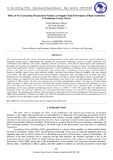Please use this identifier to cite or link to this item:
http://ir-library.mmust.ac.ke:8080/xmlui/handle/123456789/2434Full metadata record
| DC Field | Value | Language |
|---|---|---|
| dc.contributor.author | Okinyi, Naomy Kemunto | - |
| dc.contributor.author | Kwendo, Evans | - |
| dc.contributor.author | Kiongera, Fredrick N. | - |
| dc.date.accessioned | 2023-12-06T08:24:26Z | - |
| dc.date.available | 2023-12-06T08:24:26Z | - |
| dc.date.issued | 2023-11-06 | - |
| dc.identifier.uri | https://doi.org/10.51867/ajernet.4.2.82 | - |
| dc.identifier.uri | https://ajernet.net/ojs/index.php/ajernet/article/view/160 | - |
| dc.identifier.uri | http://ir-library.mmust.ac.ke:8080/xmlui/handle/123456789/2434 | - |
| dc.description.abstract | The study focused on the effect of pre-contracting procurement practices on the supply chain performance of road authorities in Kakamega County, Kenya. Implementing and adopting the procurement Contracting practices in public institutions have continuously faced challenges due to their complexity and lack of resources, which directly impact supply chain performance. Institutions are operating in a competitive business environment with many players, and massive changes are taking place daily to improve their performance. The key to optimal performance is understanding the contributions of pre-contracting procurement practices. The study covered three road authorities with regional offices in Kakamega County: Kenya National Highway Authority (KeNHA), Kenya Urban Road Authority (KURA), and Kenya Rural Roads Authority (KeRRA). The study adopted system theory. The study employed the causal research method to explain the causes and effects of the variables. The target population was 48 respondents, comprised of supply chain officers, road officers, and account officers on the road authorities. A census method was employed in the study. Structured questionnaires were used as data collection instruments. Pilot testing was conducted in Vihiga County. The data was analyzed using descriptive and inferential statistics. The data was presented using tables and figures. A Likert scale was used to determine how strongly variables agreed or disagreed with statements on a five-point scale. Regression analysis shows that pre-contracting procurement practice had no significant effect on supply chain performance in the road authorities of Kakamega County, Kenya (t = 0.605, P > 0.05). This means that road authorities in Kakamega County that effectively implement pre-contracting procurement practices are more likely to have high-performance supply chains. The findings of this objective indicated that pre-contracting had P 0.05 and contributed to 0.8% of the changes in supply chain performance. Therefore, according to the study, the institutions need to re-examine their procurement practices so as to capitalize on areas that improve supply chain performance. | en_US |
| dc.language.iso | en | en_US |
| dc.publisher | AFRICAN JOURNAL OF EMPIRICAL RESEARCH | en_US |
| dc.subject | Effect, Pre-Contracting, Procurement, Practices,Supply, Chain, Performance of Road, Authorities, County, | en_US |
| dc.title | Effect of Pre-Contracting Procurement Practices on Supply Chain Performance of Road Authorities in Kakamega County, Kenya | en_US |
| dc.type | Article | en_US |
| Appears in Collections: | Gold Collection | |
Files in This Item:
| File | Description | Size | Format | |
|---|---|---|---|---|
| Naomy+Okinyi+et+al.+-+Effect+of+Pre-Contracting+Procurement+Practices+on+Supply+Chain+Performance+of+Road+Authorities+in+Kakamega+County,+Kenya+(1).pdf | 419.09 kB | Adobe PDF |  View/Open |
Items in DSpace are protected by copyright, with all rights reserved, unless otherwise indicated.
